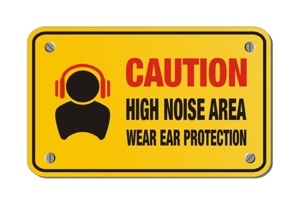 Hearing loss may be a compensable work injury leading to increased workers compensation insurance costs. Taking steps to reduce the risk of hearing loss is easier than you might think.
Hearing loss may be a compensable work injury leading to increased workers compensation insurance costs. Taking steps to reduce the risk of hearing loss is easier than you might think.
Loud noises in the workplace can damage your employees’ hearing. It’s estimated that 22 million workers are exposed to potentially hazardous noise levels at work. The National Institute for Occupational Safety and Health (NIOSH) recommends that workers should not be exposed to noise at a level that amounts to more than 85 decibels for 8 hours. In an effort to create a safer workplace by reducing noise levels, NIOSH suggests an approach that implements controls based on a hierarchy of effectiveness.
Control Workers Comp Premiums by Adopting the Hierarchy of Hazard Controls
Occupational health and safety professionals apply the following actions, listed from most effective to least effective, to reduce or remove a noise hazard:
- Elimination: Physically remove the hazard
- Substitution: Replace the hazard
- Engineering Controls: Isolate workers from the hazard
- Administrative Controls: Change the way employees work
- Personal Protective Equipment: Protect workers with special clothing and equipment
Low-Noise Tools
Purchasing low-noise tools and machinery, reducing vibration where possible, providing barriers to isolate workers or loud equipment, and maintaining machinery with proper lubrication are effective methods for reducing noise in the workplace.
In addition, the Occupational Safety and Health Administration (OSHA) requires employers in general industry to maintain a hearing conservation program whenever noise exposure meets or exceeds the eight hour time-weighted average of 85 decibels. Baseline and annual audiograms, employee training, and hearing protection must all be included in the program.
But even with controls and programs in place to eliminate or reduce noise hazard on the job, some employees will experience work-related hearing loss resulting in a compensable work injury resulting in a workers compensation insurance claim.
Hearing loss may be a compensable work injury
The Workers’ Compensation Act provides for benefits for loss of hearing related to exposure to noise while at work, and it’s estimated that $242 million is spent annually on workers’ compensation for hearing loss disabilities.
While most states recognize hearing loss as compensable, the specifics of the law may vary (for instance, in some states the employee must have hearing loss of at least ten percent in both ears in order to be entitled to benefits). The employee must be evaluated by a physician who specializes in hearing problems to determine the percentage of hearing loss, and the worker must show that there was exposure to hazardous noise in the workplace.
The difficulty for any workers’ compensation adjuster will be determining what portion of hearing loss is work-related and what part of the loss is age-related or is due to non-work related activities (shooting a gun for sport or using a chainsaw on weekends). Another issue that the adjuster may face is finding a previous audiogram from which to compare the present test to get a true measure of hearing loss.
Protect your business against hearing loss claims
There are steps that employers can take to eliminate or reduce the size of a hearing loss workers comp claim, and in the process lower your long-term workers compensation insurance costs:
- New employees who will be exposed to excessive noise should have an audiogram completed as part their hiring requirements. This will provide the baseline for any future hearing loss claim.
- Do a risk assessment by having the decibel level of your plant checked. Any noise level above 85 decibels can then be addressed.
- If a worker is constantly exposed to tools and machinery that reach more than 85 decibels, an audiogram should be completed annually.
- The mandatory use of hearing protection (earplugs or earmuffs) should apply to all employees who work in areas of excessive noise.
- All employees should be provided with safety materials that address the importance of hearing protection at work and in non-work related activities that create high noise levels.
Occupational hearing loss is one of the most common work-related illnesses. Safeguard your workers and minimize the costs to your business by effecting and maintaining these essential controls and programs.
Workers Comp Questions? Contact Us!
To learn more about Workers Compensation Insurance, contact us online or call (800) 947-1270 or (610) 775-3848.



 Over 4,000 employees are injured, and another 325 die each year in workplace electrical accidents. Do not let this be one of your employees! Protect your employees and minimize your workers compensation insurance costs through proper safety procedures.
Over 4,000 employees are injured, and another 325 die each year in workplace electrical accidents. Do not let this be one of your employees! Protect your employees and minimize your workers compensation insurance costs through proper safety procedures.
 Employees who are injured on the job may be entitled to compensation for medical care and wage replacement through their employer’s
Employees who are injured on the job may be entitled to compensation for medical care and wage replacement through their employer’s For construction workers and others whose jobs require them to be outside, winter means a few months of extreme cold and challenging days, during which they will be susceptible to cold-related injuries.
For construction workers and others whose jobs require them to be outside, winter means a few months of extreme cold and challenging days, during which they will be susceptible to cold-related injuries. Click here to contact us
Click here to contact us Medicaid is an entitlement program, jointly funded at the state and federal levels, which provides healthcare--both medical and long-term custodial care--to the poorest population of the United States. Not to be confused with Medicare, the federally funded program available to most U.S. citizens and permanent legal residents who are age 65 or older, eligibility for Medicaid is means-based, and the program has strict income eligibility requirements that vary from state to state.
Medicaid is an entitlement program, jointly funded at the state and federal levels, which provides healthcare--both medical and long-term custodial care--to the poorest population of the United States. Not to be confused with Medicare, the federally funded program available to most U.S. citizens and permanent legal residents who are age 65 or older, eligibility for Medicaid is means-based, and the program has strict income eligibility requirements that vary from state to state. When one of your employees is injured on the job, it sets off a sequence of procedures that must be adhered to in order to protect your business. If a claim is filed--whether compensable or contested—it is imperative that you have the necessary documents on file. Documentation for
When one of your employees is injured on the job, it sets off a sequence of procedures that must be adhered to in order to protect your business. If a claim is filed--whether compensable or contested—it is imperative that you have the necessary documents on file. Documentation for  Click here to contact us
Click here to contact us Workers' compensation insurance
Workers' compensation insurance Today’s businesses are paying greater attention to their employees’ wellness. Some are even taking a more holistic approach in which “wellness” is being supplanted by “well-being.” Whether your business is providing employees with fitness programs, diets, and screenings or adding meditation and massages into the mix, your employees reap tangible benefits…and so do you.
Today’s businesses are paying greater attention to their employees’ wellness. Some are even taking a more holistic approach in which “wellness” is being supplanted by “well-being.” Whether your business is providing employees with fitness programs, diets, and screenings or adding meditation and massages into the mix, your employees reap tangible benefits…and so do you. Businesses today face challenges in managing a
Businesses today face challenges in managing a 
 In the early 1990’s when many states began passing workers compensation insurance acts, there was a prerequisite that any compensable injury had to have a physical impact. That has changed over the years.
In the early 1990’s when many states began passing workers compensation insurance acts, there was a prerequisite that any compensable injury had to have a physical impact. That has changed over the years. To learn more about saving on
To learn more about saving on 



